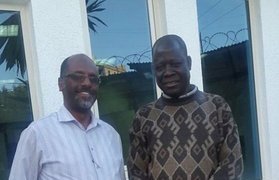Africa and Asia
Ethiopian Land Rights Activists Freed
Ethiopia’s repression of land rights activists
For years, thousands of opposition politicians, indigenous and religious leaders, students, journalists, and others were prosecuted, tortured, and imprisoned for speaking out on the human rights and governance crises in Ethiopia. Since the 2009 enactment of Proclamation No. 652, known as the Anti-Terrorism Law, people from all walks of life had been found to be “terrorists.” Expatriates who opposed the administration were kidnapped and brought to Ethiopia; some were charged with crimes for actions that took place before the law even took effect; and many reported having been tortured, with their “confessions” used against them at trial.
The case of Okello Akway Ochalla
In 2003, a brutal massacre of hundreds of Anuak people took place in Gambella province. Mr. Okello Akway Ochalla, the governor of Gambella and an Anuak himself, fled Ethiopia with his young children, eventually obtaining Norwegian citizenship along with his family. He remained openly critical of the government’s role in the massacre and the ongoing human rights abuses and mass evictions caused by large scale and mostly foreign agricultural projects in Gambella.
In 2014, while visiting relatives in South Sudan, Okello was abducted by the Ethiopian government, charged under the Anti-Terrorism Law, and held in solitary confinement at the notorious Maekelawi prison. His “crimes” included speaking to the international media about the 2003 massacre and the plight of the people of Gambella. EDLC was asked by the Oakland Institute, a highly respected organization specializing in agricultural land grab issues around the world, to assist in its work on behalf of Mr. Okello and other persecuted Ethiopian environmental defenders.
A challenge to the Anti-Terrorism Law, and a mock trial
Critics of the law—including the United Nations and the world’s leading democracies—claimed that the government had repeatedly misused the law, pointing out that it included a vague definition of terrorism, gave the police unprecedented new powers, and violated constitutional rights. EDLC enlisted a team of international lawyers to analyze the law and its use by the government. Their comprehensive report concluded that the law violated international human rights law, as well as modern legal standards, and served as a tool of repression, designed and used by the government to stifle its critics and criminalize the discussion of public affairs. The much-publicized report urged the government to revise the law and halt its misuse.
At Mr. Okello’s trial, the heart of the prosecutor’s case was a “confession” allegedly signed in solitary confinement. The proceedings were prolonged by endless inexplicable delays, and eventually resulted in a conviction on some of the charges, with a sentence of nine years of imprisonment. An appeal was filed but was predictably unsuccessful.
Freedom!
The Oakland Institute, assisted by EDLC and others, continued its persistent efforts on Mr. Okello’s behalf, including working with members of the U.S. Congress and publicizing Mr. Okello’s and other activists’ cases at the international level. On February 14, 2018, Mr. Okello was released after being held for nearly four years, and returned to Norway. His release came shortly before Abiy Ahmed became prime minister and the government released thousands of political prisoners from detention. The government admitted that security forces relied on torture, committed to legal reforms of repressive laws, and introduced numerous other reforms, paving the way for improved respect for human rights.


The case of Admasu Lokaley Kidewa
In 2017, EDLC was again requested by the Oakland Institute to work on behalf of a persecuted land rights activist, Admasu Lokaley Kidewa, a member of the Nyangatom minority indigenous tribe. Admasu holds an advanced degree in conflict resolution, and for nearly twenty years had been a voice for his community opposing land-related human rights abuses by the government, including co-founding a local NGO that worked on peace-building at the grassroots level.
For years, Admasu had faced threats and intimidation from the government, and the communities with which he worked lived under a climate of continuous fear. In 2015, he was arrested and tortured while in custody for four months. Charges were never brought, and he was finally released. In 2016, he was the recipient of a U.S. State Department Mandela Washington Fellowship, but upon his return to Ethiopia, he was detained and interrogated about the reason for his travel to the U.S., and remained under watch and received threats.
When the police again started looking for him, Admasu fled Ethiopia on January 10, 2017. Upon arrival in Atlanta, he indicated his desire to seek political asylum. EDLC immediately obtained pro bono help from the highly-regarded firm of Kilpatrick Townsend & Stockton, as well as the Georgia Asylum & Immigration Network. During the months that followed, the team worked tirelessly on Admasu’s behalf, compiling volumes of documentary evidence, including expert testimony, on the reasons why he would face persecution should he be forced to return to Ethiopia. On May 25, 2017, the judge ruled in Admasu’s favor within hours of the completion of his hearing. He now lives in the U.S. with his family.

